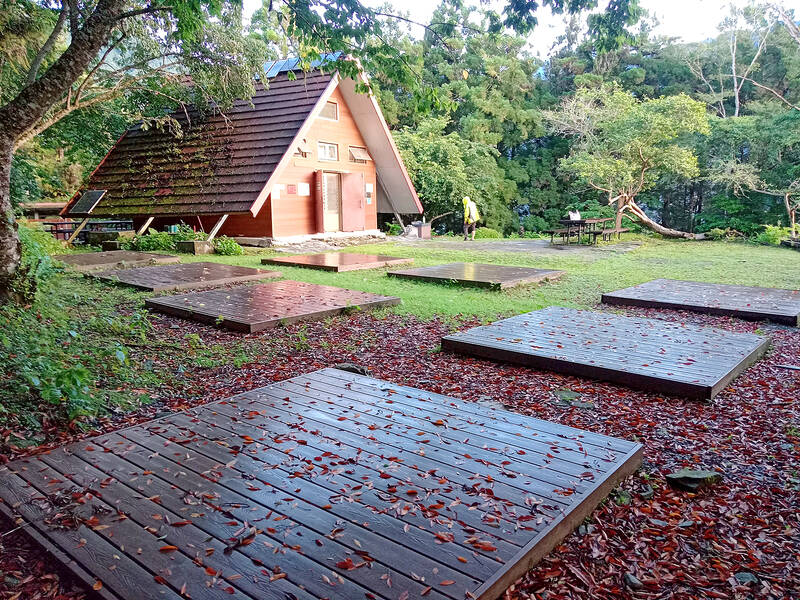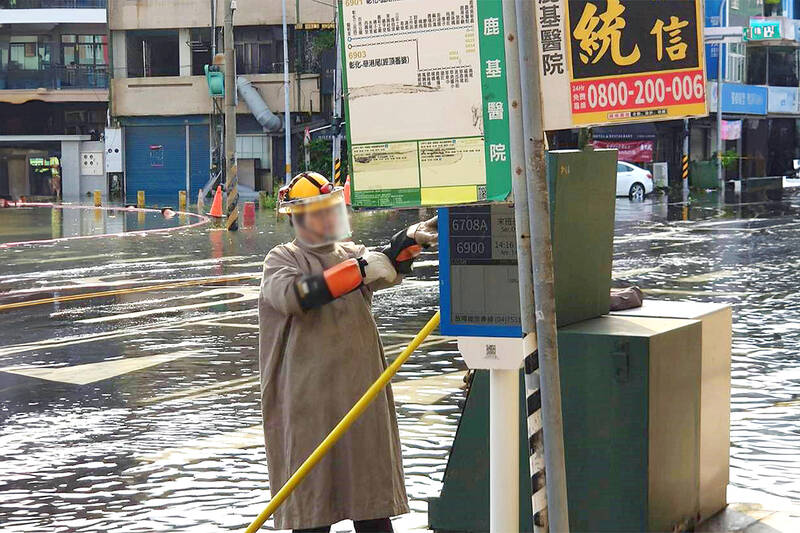A couple of weeks ago the parties aligned with the People’s Republic of China (PRC), the Chinese Nationalist Party (KMT) and the Taiwan People’s Party (TPP), voted in the legislature to eliminate the subsidy that enables Taiwan Power Co (Taipower) to keep up with its burgeoning debt, and instead pay for universal cash handouts worth NT$10,000. The subsidy would have been NT$100 billion, while the cash handout had a budget of NT$235 billion. The bill mandates that the cash payments must be completed by Oct. 31 of this year. The changes were part of the overall NT$545 billion budget approved by the pro-PRC parties.
The cash handout gives every appearance of being vote-buying for the recall campaign. As I traveled around Taiwan last week, I photographed many signs for local KMT politicians that did not display the party logo. Clearly the KMT felt nervous.
TAIPOWER SUBSIDY

Photo: TT file photo
More interesting than the sordid spectacle of the allegedly conservative party creating more government debt to buy votes was the elimination of the Taipower subsidy. The subsidy itself has become an annual ritual, usually passed in the fall, as Taipower has piled up enormous debts by keeping electricity prices too low. Like most government subsidies, it exists to prevent meaningful system change by giving the appearance that something is being done.
Democratic Progressive Party (DPP) Premier Cho Jung-tai (卓榮泰) said that the pro-PRC parties have rejected or cut Cabinet proposals for supplementary budgets, general budgets and three separate acts to support Taipower. In other words, the attack is not limited merely to the subsidy, but to the whole idea of fixing Taipower. Cho said that the government would use its budgets to support Taipower.
That last statement reveals the purpose of the KMT and the TPP in killing the Taipower subsidy: it forces the government to make cuts elsewhere. When the public experiences the reduction in services, it will blame the DPP. It may also force the government to raise electricity prices, which the DPP will also take the blame for. Indeed, during the debates over the Taipower subsidy the government sensibly would not commit to freezing electricity prices.

Photo courtesy of the National Park Service
The elimination of the Taipower subsidy recalls the moment in March of 2016 when, just before the DPP’s Tsai Ing-wen (蔡英文) became president, the KMT government cut electricity prices by 9.5 percent, then the largest cut ever. The government claimed that the international fuel price situation made that possible. Yet it had a chance to clear some of Taipower’s debt, already enormous at that time, simply by not moving electricity prices.
The purpose of the March 2016 rate cut was obvious: with Taipower’s debts rising, the DPP would be forced at some point to raise electricity prices, incurring public wrath, and the anger of businesses addicted to low electricity prices. The pressure of the debt is a useful political tool against the DPP. The DPP must deliver good governance if Taiwan is to remain free. The KMT is not so constrained.
As political scientist Kharis Templeman noted at the time, low electricity prices drive demand for cheap nuclear power. They also, as I observed, reduce support for investments in renewables. They are also a sop to the zombie businesses (read: traditional industries) dependent on the flow of government subsidies to survive.

Photo courtesy of Changhua Christian Hospital
Thus, economic pressure on Taipower has other effects that may help the KMT. It may further generate support for reviving Taiwan’s dead nuclear plants. Eliminating the subsidy for Taipower may increase the public’s sense of crisis. This works in tandem with Taipower’s sketchy “margin” calculations, which also appear to be designed to increase the sense of crisis, as I wrote in March (“The useless debate over energy,” March 31, 2025). The KMT likely intends the cuts to increase public support for the referendum on re-opening Ma-anshan Nuclear Plant slated for Aug. 23, along with more recalls of KMT politicians. That may in turn increase the turnout of KMT voters.
When the KMT in January proposed these cuts, KMT Caucus Whip Fu Kun-chi (傅?萁), said that the DPP was exploiting taxpayers to subsidize Taipower. He said that DPP policy was driving up electricity prices and forcing firms to relocate. Since removing subsidies could only force electricity prices up, Fu lamely attempted to explain away this contradiction by calling the NT$100 billion subsidy the wrong approach. Naturally he couldn’t say out loud the KMT’s goal was to force the DPP to raise electricity prices and eat the blame.
ANGERING VOTERS
Taipower and its workforce have traditionally been strongly aligned with the KMT, so the cuts, like so many of the other KMT budget cuts and freezes, have angered would-be supporters. Moreover, as Brian Hioe noted in a piece on how public anger is driving the recalls, “targeting Taipower at a time when Taipower workers have been publicly praised for their efforts to restore the power grid after Typhoon Danas left over 900,000 households without power earlier this month may not prove wise.”
KMT officials, notorious in election after election for dismissive and contemptuous comments about the electorate, continued throughout the recall with numerous abusive remarks. Nor have they downplayed their pro-China views. Andrew Hsia (夏立言), the KMT’s vice-chairman, visited the PRC twice this year, in February and again in April, leading delegations of KMT officials. He called for support for the fictional “1992 consensus”, which is unpopular, and averred that Taiwan is part of China. These claims have been echoed by several KMT officials throughout the recall campaign. The public has seen and heard this.
One of the KMT’s most widely circulated talking points is that the recalls are costly, NT$1.62 billion, according to Central Election Commission (CEC) figures (the KMT originally proposed freezing the CEC budget back in January, which DPP officials said was to halt the recalls). Elections are cheap. Budget cuts are expensive, especially to infrastructure and defense programs, which may go on for years. Each time they are slowed or stopped, additional future costs are incurred. Cuts to services simply redistribute costs to individuals or already overwhelmed and underfunded non-profits (felt by many voters). The public may be like the wise men who grasp only their tiny part of the elephant, but they are aware that the budget for the part they are holding has been cut.
I often remark that the KMT is not a political party, but the Leninist political wing of a colonial elite. Never has this been more publicly demonstrated by the KMT than during the recall campaign. Save for some adjustments to the budget cuts, the KMT has behaved throughout this political crisis with unmitigated China-centric paternalism. KMT actions may have sparked the recall movement, but its attitude helps sustain it.
Notes from Central Taiwan is a column written by long-term resident Michael Turton, who provides incisive commentary informed by three decades of living in and writing about his adoptive country. The views expressed here are his own.

Dissident artist Ai Weiwei’s (艾未未) famous return to the People’s Republic of China (PRC) has been overshadowed by the astonishing news of the latest arrests of senior military figures for “corruption,” but it is an interesting piece of news in its own right, though more for what Ai does not understand than for what he does. Ai simply lacks the reflective understanding that the loneliness and isolation he imagines are “European” are simply the joys of life as an expat. That goes both ways: “I love Taiwan!” say many still wet-behind-the-ears expats here, not realizing what they love is being an

Google unveiled an artificial intelligence tool Wednesday that its scientists said would help unravel the mysteries of the human genome — and could one day lead to new treatments for diseases. The deep learning model AlphaGenome was hailed by outside researchers as a “breakthrough” that would let scientists study and even simulate the roots of difficult-to-treat genetic diseases. While the first complete map of the human genome in 2003 “gave us the book of life, reading it remained a challenge,” Pushmeet Kohli, vice president of research at Google DeepMind, told journalists. “We have the text,” he said, which is a sequence of

Every now and then, even hardcore hikers like to sleep in, leave the heavy gear at home and just enjoy a relaxed half-day stroll in the mountains: no cold, no steep uphills, no pressure to walk a certain distance in a day. In the winter, the mild climate and lower elevations of the forests in Taiwan’s far south offer a number of easy escapes like this. A prime example is the river above Mudan Reservoir (牡丹水庫): with shallow water, gentle current, abundant wildlife and a complete lack of tourists, this walk is accessible to nearly everyone but still feels quite remote.

It’s a bold filmmaking choice to have a countdown clock on the screen for most of your movie. In the best-case scenario for a movie like Mercy, in which a Los Angeles detective has to prove his innocence to an artificial intelligence judge within said time limit, it heightens the tension. Who hasn’t gotten sweaty palms in, say, a Mission: Impossible movie when the bomb is ticking down and Tom Cruise still hasn’t cleared the building? Why not just extend it for the duration? Perhaps in a better movie it might have worked. Sadly in Mercy, it’s an ever-present reminder of just